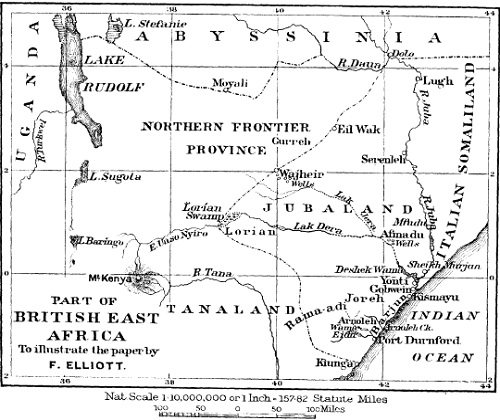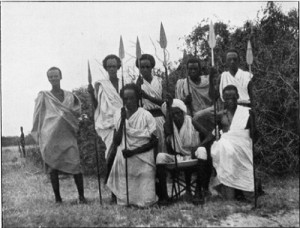The Ogaden Somali are split up into five important sub-tr/p/p/p/spapnibes, the Mohamed Zubeir, the Aulihan, the Abd Wak, the Abdullah, and the Magharbul. Two other sub-tribes are of less importance, namely, the Her Mohamed and the Habr Suliman. It is remarkable that the so-called Mad Mullah, Mohamed Abdullah Hassan, belongs to the very unimportant tribe of the Habr Suliman. Of the Ogaden in Jubaland the Mohamed Zubeir are the most influential and numerous. They occupy the Afmadu district as far south as the Deshek Wama, and own immense quantities of cattle. The Aulihan tribe frequent the district to the west and south of Serenleh. They are rich in camels as well as cattle, and the Juba river is their main water-supply.

The Abd Wak and the Abdullah tribes occupy the districts of Rauia-adi and Lorian. The latter of these tribes wander as far as the Tana river seeking for water in the dry season. The Abd Wak are the more numerous, and might be able to put 1000 spearmen and riflemen in the field. Between these two above-mentioned tribes and the Mohamed Zubeir tribe there is a constant feud which sometimes leads to a fight. The Maghaabul sub-tribe occupies the sub-district to the east of Rama-adi, known as Joreh. Though they are not strong numerically, yet they are rich in cattle.
It is, perhaps, necessary to repeat that only Darud [Darood] Somali are to be found in Jubaland, while the Ishaak Somali have remained east of the Juba, and that the Haweyah, the Dirr, and some other tribes are not really Somali, but are disowned as inferior races by the Somali. 
The true Somali is an extremely lazy person, for his dignity does not permit him to do manual work; he generally employs himself in watching his flocks, or he will lie for hours under a shady tree, his praying-mat and water-bottle beside him, while he drones, to a sort of chant, songs about his former fights and about the stock he has looted. The manual work, meanwhile, is left to the women and the dependants. The Somali is a Mussulman of the Shujai sect and is very religious in his own fashion. In appearance the Somali is an Arab, and sometimes a hand-some Arab. Treat him with confidence and consideration, he is cheerful, intelligent, willing to learn, and true to his code of honesty. Treat him harshly or unjustly, he becomes sulky, obstinate, mutinous, and dangerous. He is an excellent scout, a wonderful marcher, and very proud if confidence is shown in him. It would be fatal to the peace of the country if the Somali should be treated with that contempt which is often shown to the black races by Europeans.
Jubaland is fast filling with the Somali, who are increasing in numbers by leaps and bounds. Their camels, herds, and flocks are also multiplying in number. Except along the bank of the Juba, it can never be an agricultural country, lack of rain forbids it, but there is no reason why the trade of the country should not vastly improve if roads were made, and especially if a light railway were constructed from Kismayu northward through Afmadu to the Abyssinian frontier.